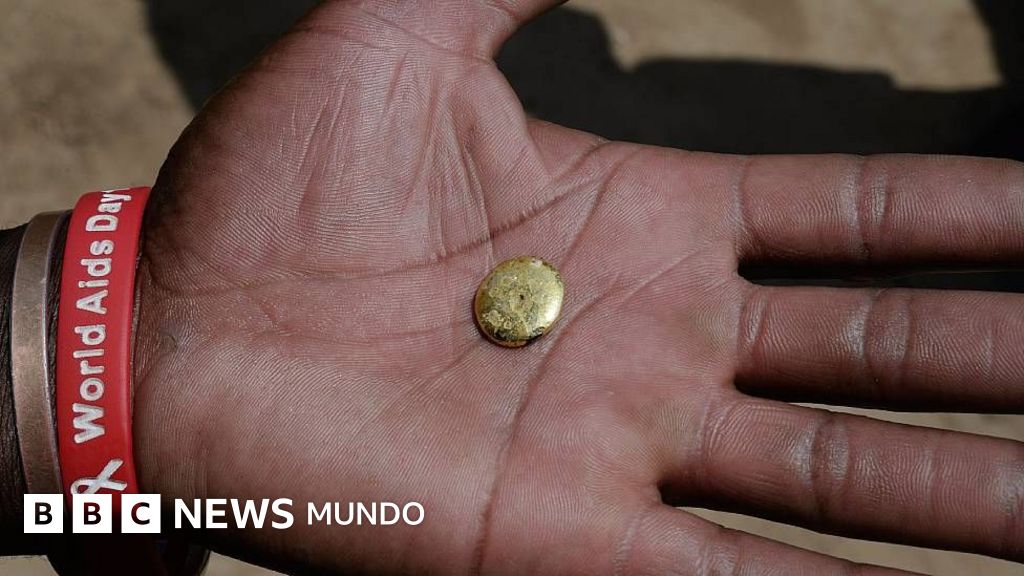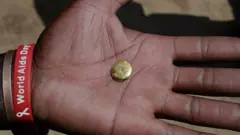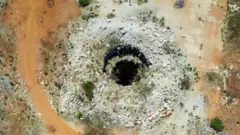

Image source, Getty Images
-
- Author, Mayweni Jones
- Author's title, BBC News, Johannesburg
This story contains details that can hurt the sensitivity of some people.
The most shocking thing for Jonathan, who endured six exhausting months living and working underground in an abandoned gold mine in South Africa, was the abuse he witnessed against minors.
Some are recruited as cheap labor, but others are specifically brought to be sexually abused, according to activists.
Jonathan, who is now around 30, emigrated to South Africa with the promise of making easy money working in one of the tens of mines abandoned by multinationals because they were no longer commercially viable.
We protect your identity because when talking with the media is exposed to reprisals of the brutal criminal gangs that control illegal mining.
The details of what the young people suffered emerged after the death of dozens of illegal miners near the city of Stilfontein at the end of last year, when a mine was blocked by the police.
With a quiet and firm voice, Jonathan describes the heat, the long days and the limited options for eating and sleeping that ended up taking its toll on their body.
But an indelible memory is what happened to minors in the mine where they worked.
“I used to see these boys in the mine; adolescents aged 15 or 17.”
“Sometimes other miners took advantage of them. It was a situation that gave a little fear and I didn't feel comfortable.”
Jonathan said that minors were raped by adult miners who promised them part of the gold they found in exchange for sex.
“If a minor is desperate for money, he will risk.”
Sometimes young people resorted to a group of miners in search of protection, but “that group put conditions,” adds Jonathan.
Sex was also used as punishment if teenagers did not complete a task for their group.
Jonathan says that all minors were foreigners and did not suspect when they arrived at the mine what was the situation in which they got into.

Image source, AFP
The researcher and activist Makhotla Sefuli supports this statement.
He assures that criminal gangs specifically look for children to work in illegal mines throughout South Africa.
Many of the minors are kidnapped in neighboring and trafficked countries. Or attract them with unfounded promises to find employment in the formal mining industry.
“They are confiscated by passports when they arrive in South Africa … it is well known that these young people suffer abuses,” says Sefuli.
The BBC spoke with miners who worked in at least two other illegal mines and claim to have seen children being abused in the mines.
Tshepo (fictitious name) says he says that he saw older men forcing minors to have sex with them underground.
“In some cases the boys did for money. Others recruit only for that purpose, due to the economic incentives that the practice of sexual trade under earth entails.”
Tshepo adds that abuse deeply affects minors. They change their behavior patterns and have trust problems. “They don't want you to approach them, because they feel they can't trust anyone anymore.”
The illegal mining industry in this country monopolized international headlines last year after a confrontation between the police and the miners in the Buffelsfontein Gold mine, near the city of Stilfontein, in the province of Northwest, one of the nine that make up South Africa.

Image source, Getty Images
The authorities had been trying to stop illegal mining, which according to the government cost the South African economy US $ 3.2 billion in lost revenues last year.
In December 2023, the authorities launched an operation called Vala Umgodi, or “seal the well”, promising to adopt a firm position against the bands.
As part of the operation, the police limited the amount of food and water that went down to the Stilfontein mine to, according to a minister, “expel with smoke” to illegal miners.
The authorities said that men refused to go out for fear of being arrested.
Soon images of the interior of the mine began to appear that showed dozens of emaciated men pleading to be rescued, as well as rows of bags with corpses. Finally, a court ordered the authorities to rescue men.
Among those rescued there were many who claimed to be minors, but as several were migrants without documents that confirmed their age, the authorities performed medical tests to obtain an estimate.
Thanks to this, the Department of Social Development (DSD) confirmed that 31 of Stilfontein's rescued miners were minors. All were Mozambiqueños and in November 27 of them were repatriated.
Save The Children South Africa helped translate some of the interviews between minor miners and rescuers.
“They experienced trauma, because some also saw others being sexually exploited,” Gugu Xaba, executive director of the NGO in the African country, told BBC. The feeling that they could not leave those children mentally.
“Adult miners began by manipulating them, pretending that they had sympathy.”
Then they forced children to perform sexual acts with adults and shortly after they raped them day after day.
“An adult could be abusing three or four minors.”

Image source, Getty Images
Xaba states that mining bands recruit minors because they are easier to manipulate and cheaper.
“The minors do not understand when you tell them: 'I will pay you a dollar a day.' Adults sometimes refuse to work, but children have no other option. So it is easier to use a minor to do the job. It is easier to take down a boy who has no voice.”
Xaba states that in addition to economic exploitation, there are bands that recruit minors specifically for sexual purposes.
Many illegal miners spend months underground and rarely rise to the surface. There are underground markets that provide them with everything they need.
“The majority of minors are victims of trafficking to be used as sex slaves. And there is a pimp that takes the money, which means that every day this minor is used as a commercial sex worker.”
The BBC asked the police and the DSD if someone will face charges for accusations of sexual abuse. None of the institutions responded to our requests. A source that works in the cases of Stilfontein miners said that many of the minors did not want to testify.
Meanwhile, the illegal mining industry continues to thrive.
It is estimated that there are about 6,000 vacancies in South Africa potentially available to explore. It is a business that will probably not disappear soon, and this leaves thousands of vulnerable minors.

Subscribe here To our new newsletter to receive every Friday a selection of our best content of the week.
And remember that you can receive notifications in our app. Download the latest version and act.